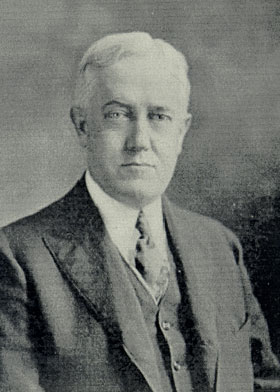John W. Davis
From dKosopedia
Categories: West Virginia Democrats | Presidential candidates
John William Davis (1873-1955) was the Democratic nominee for president in 1924. His 28.8% of the popular vote is the lowest ever received by a Democrat in a presidential election since the party's founding.
Davis was born in West Virginia to John James Davis, a legislator who had opposed ratification of the Fifteenth Amendment and who had opposed the ending of slavery in West Virginia. Davis inherited much of his father's conservative politics, supporting the poll tax and segregation, and opposing womens' sufferage, federal anti-lynching laws, and anti-child labor laws. He maintained his allegience to the Democrats even as his party grew much more liberal and he grew increasingly close to business interests often championed by Republican politicians.
Davis was elected to the House of Representatives in 1910, but resigned after being re-elected in 1912 to serve as solicitor general under Woodrow Wilson. In this capacity, he argued for the illegality of the "grandfather law" in Oklahoma, which had kept many blacks from voting.
Davis was selected on the 103rd ballot of the Democrat convention in 1924, as a compromise between the forces backing New York governor Alfred E. Smith and California Senator William McAdoo. Davis won only the 11 states of the former Confederate States of America plus Oklahoma, winning only 28.8% of the popular vote, losing to Calvin Coolidge (Davis lost the electoral vote 382 to 136). 16.5% of the popular vote and 13 electoral votes went to Robert LaFollette of Wisconsin, who argued that both Coolidge and Davis were too conservative.
Some southerners and other Democrats had deserted Davis because they believed that his work as solicitor general signaled an unfriendliness to segregation, despite Davis' own claims to the contrary. Davis' condemnation of the Ku Klux Klan and his opposition to prohibition (which he believed encouraged a growth in organized crime) also hurt him among party conservatives.
Davis became more famous after his defeat as an attorney, arguing over 140 cases before the U.S. Supreme Court. Davis argued unsuccessfully for the repeal of some New Deal legislation, and also argued in favor of "seperate but equal" in Brown v. Board of Education. Davis died a year after losing that case.
As an interesting aside, campaign buttons for Davis' 1924 race are among the rarest. One depicting portraits of Davis and his running mate in Oregon sold at auction for $56,000.

![[Main Page]](../../../../upload/banner-blue-135.jpg)